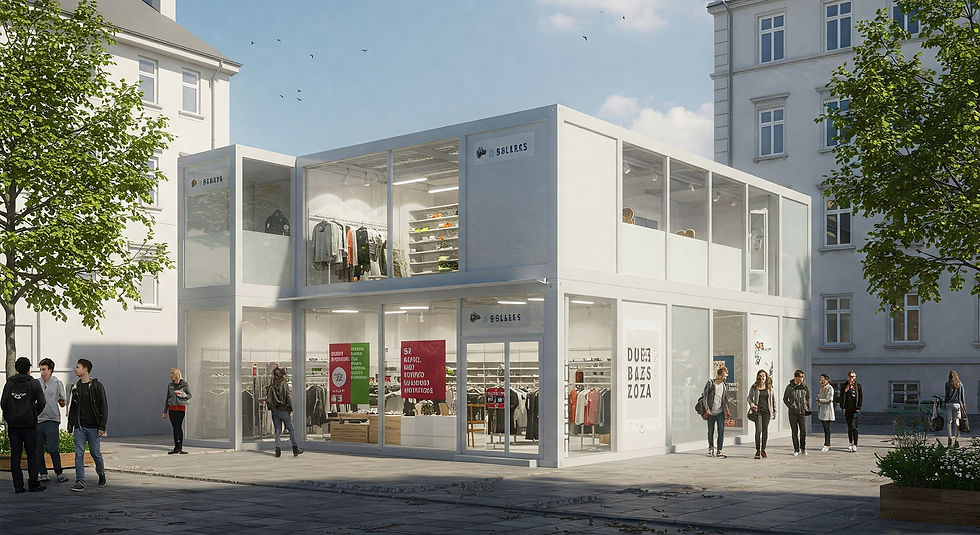Retail Modular Construction: A Faster, Smarter Future
- Audree Grubesic

- Mar 17, 2025
- 3 min read
As the construction industry evolves, modular construction is proving to be a game-changer, particularly in the retail sector. At Advancing Prefab, Offsite Dirt had the opportunity to speak with Jesse Goldman from CSHQA, an architectural firm specializing in modular retail designs. The discussion shed light on the efficiency, innovation, and future potential of retail modular construction.
Why Modular Construction is Transforming Retail
Retail businesses thrive on speed and consistency. Traditional construction timelines can be unpredictable and lengthy, causing delays in openings and revenue generation. This is where modular construction steps in as a faster and more reliable alternative.
“Retailers can get their buildings up and running much faster compared to traditional construction,” Jesse explained. “Modular projects follow strict standards, ensuring a higher quality product than many site-built structures.”
Brands benefit from modular construction in multiple ways:
✔ Faster Time-to-Market – Prefabricated retail units reduce construction timelines significantly.
✔ Standardized Quality – Factory-built components ensure precision and consistency.
✔ Cost Efficiency – Modular construction optimizes material usage and reduces on-site labor costs.
Designing for Speed and Consistency
CSHQA’s role in the modular construction process extends beyond architecture—it involves collaboration with factories, brands, and regulatory bodies to ensure seamless execution.
“Most franchises have specific parameters,” Jesse shared. “We work with brands to design a building that can be efficiently manufactured in a modular format while ensuring compliance with state regulations.”
This process requires understanding:
🔹 Brand Identity – Ensuring each modular store reflects the company’s design and experience.
🔹 Factory Capabilities – Adapting designs to suit the capabilities of different manufacturing plants.
🔹 Climate Adaptation – Modifying wall systems and materials based on regional climate conditions.

Navigating Challenges: Codes, Permits, and Logistics
Retail modular construction, especially in food service, must meet strict health and safety codes that vary across jurisdictions.
“There are unique code requirements in the food industry,” Jesse noted. “We design with the most restrictive standards in mind, so the buildings remain compliant across different locations.”
Beyond compliance, logistics play a crucial role. During a recent factory visit in Phoenix, we observed an interesting process:
🔹 The entire structure is built and assembled inside the facility.
🔹 It is then disassembled and shipped to the final location.
🔹 Upon arrival, it is reassembled on-site for final inspection and activation.
This process ensures that every component fits perfectly, reducing unexpected on-site adjustments.
From Factory to Opening in Record Time
One of the biggest advantages of modular construction is the speed of deployment. Jesse shared an impressive example:
📌 A retail store was delivered and fully operational within two weeks.
“Typically, a modular retail project is built in 60 to 90 days, transported, and then operational in six to twelve months—often driven by permit approvals,” he added.
For businesses, this means faster revenue generation, lower risk, and a competitive advantage in high-demand locations.
The Future of Retail Modular Construction
The modular approach is gaining traction across various industries. Jesse highlighted their experience working with coffee chains, pizza brands, bagel shops, and QSRs (quick-service restaurants) across multiple states.
“Franchise companies are now seeing the long-term benefits of modular systems,” Jesse said. “By partnering with experienced architectural firms like CSHQA and qualified modular factories, businesses can scale more efficiently.”
Conclusion
The retail industry is rapidly embracing modular construction as a solution to speed, quality, and scalability challenges. Events like Advancing Prefab provide a platform for industry leaders to exchange insights, push innovation forward, and redefine how retail spaces are built.
With brands, architects, and manufacturers working together, the future of retail construction is modular, efficient, and built for success.
🚀 Stay tuned for more insights from the world of offsite construction with Offsite Dirt Network!




Comments